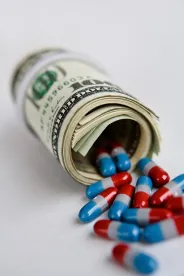The law would prohibit most gifts to healthcare professionals and providers.
Earlier this month, the California Senate passed SB 790, a bill that, if enacted, could dramatically change the landscape of interactions between physicians and pharmaceutical companies in the state. Among other things, this bill would prohibit pharma companies from offering or paying any gifts to physicians. The bill broadly defines the term “gift” as “anything of value provided for free to a health care provider” or “a payment, food, entertainment, travel, subscription, advance, service, or anything else of value provided to a health care provider, unless it is an ‘allowable expenditure’ or the health care provider reimburses the cost at fair market value.”
If a pharmaceutical manufacturer cannot fit a payment made to a physician into an “allowable expenditure,” it may be liable for a civil penalty of up to $10,000 for each violation of the law, as well as costs and attorney fees. This rule will be enforced by the California Attorney General.
Citing studies that suggest that physicians who receive industry payments are more likely to prescribe brand-name drugs at an exceptionally higher rate—two to three times more—than other physicians in their specialties, the authors of this bill seek to substantially change prescribing practices by ostensibly de-incentivizing healthcare providers. The legislative comments to this bill assert that the United States spends $73 billion annually on brand-name prescription drugs for which generic equivalents are available, resulting in approximately $24 billion in unnecessary overpayments for these products. These comments also assert that “[physician] interaction with the pharmaceutical industry” is associated with several negative consequences, including patient safety risks, drug cost increases, less availability of generic drugs, and less attention paid to evidence-based prescribing practices.
SB 790 would limit financial interactions between pharma and healthcare providers to “allowable expenditures.” These allowable expenditures include the following:
-
Conferences. Payment to the sponsor of a significant educational, medical, scientific, or policy conference, so long as that payment is not made directly to a healthcare professional or pharmacist and the funding is used solely for bona fide educational purposes, except that the funding may also be used for meals and food for conference participants. The content of these conferences must be objective and free from industry control, and must not promote specific products.
-
Honoraria. Honoraria and expense reimbursement for healthcare professionals who serve on the faculty of a bona fide educational, medical, scientific, or policy conference, so long as these payments are governed by an explicit contract with specific deliverables that are restricted to medical issues, not marketing activities. The content of any presentation, including slides and written materials, must be determined by the healthcare professional.
-
Salary Support for Clinical Trials. For a bona fide clinical trial, payment of annual direct salary support for principal investigators and other healthcare professionals.
-
Compensation and Expenses for Systematic Investigations. For research projects that constitute systematic investigations, are designed to develop or contribute to general knowledge, and can be reasonably considered to be of significant interest or value to scientists or healthcare professionals within that field, payment of gross compensation, direct salary support for healthcare professionals, and expense reimbursement.
-
Royalties and Licensing Fees. Royalties and licensing fees paid to a healthcare provider in return for contractual rights to use or purchase a patented discovery owned by the healthcare provider.
-
Interview Expense Reimbursement. Expense reimbursement for manufacturer interview of healthcare professionals in connection with a bona fide employment opportunity or for the provision of healthcare services to employees of the manufacturer.
-
Meals. The provision of meals for healthcare providers not to exceed $250 per provider annually.
Notably, the bill introduces a definitional difference between “health care professional” and “health care provider.” The latter term includes “health care professionals” but also includes hospitals, nursing homes, pharmacists, health plans, or other entities authorized to dispense or purchase for distribution prescription drugs. The allowable expenses for royalties and meals are permitted to the larger class of “health care providers,” whereas the other allowable expenditures are limited to “health care professionals” directly.
Consistent with many industry codes of ethics, the conferences and seminars for which allowable expenditures may be made must be accredited by the Accreditation Council for Continuing Medical Education (ACCME) or a comparable organization (or be presented by an approved sponsor of continuing education and not a pharma company) and must offer continuing education credits, feature multiple presenters on scientific research, or be for the purpose of recommending or making policy.
Importantly, though the California Board of Pharmacy regulates medical device companies, this bill will not apply to manufacturers of medical devices.
SB 790 passed the California Senate by a vote of 23–13 but has further legislative hurdles before enactment. The bill is currently awaiting assignment to an Assembly Committee. If the Assembly Committee and the larger Assembly agree to pass the bill without additional amendment, California Governor Jerry Brown will then decide whether to enact the bill into law.
California is often a pioneer in state legislation, particularly involving healthcare and social services. If SB 790 is ultimately enacted, other states may enact or update current marketing regulations involving industry and healthcare professionals. Currently, seven states have regulations that limit or ban industry gifts to physicians or require tracking and reporting separately from the federal US Sunshine transparency provisions. While there are similarities in purpose and some requirements, often the scope of these varied marketing regulations differs in significant ways that create compliance challenges and exposures for companies and physicians. These differences raise the question whether transparency regulations should evolve to more uniform requirements or defer to federal transparency requirements.





 />i
/>i
